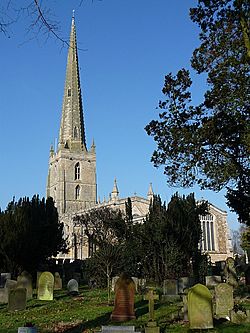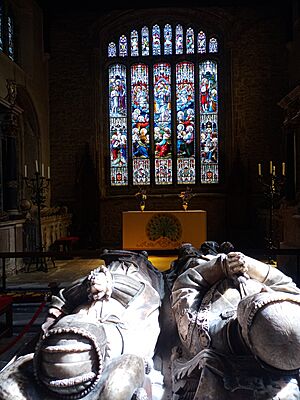St Mary the Virgin's Church, Bottesford facts for kids
Quick facts for kids St Mary the Virgin's Church, Bottesford |
|
|---|---|

St Mary the Virgin's Church, Bottesford,
from the southeast |
|
| Lua error in Module:Location_map at line 420: attempt to index field 'wikibase' (a nil value). | |
| OS grid reference | SK 807 391 |
| Location | Bottesford, Leicestershire |
| Country | England |
| Denomination | Anglican |
| Website | St Mary, Bottesford |
| History | |
| Status | Parish church |
| Dedication | Saint Mary the Virgin |
| Architecture | |
| Functional status | Active |
| Heritage designation | Grade I |
| Designated | 1 January 1968 |
| Architect(s) | Sharpe and Paley (1847–48 restoration) |
| Architectural type | Church |
| Style | Gothic |
| Administration | |
| Parish | Bottesford |
| Deanery | Framland |
| Archdeaconry | Leicester |
| Diocese | Leicester |
St Mary the Virgin's Church is a beautiful old church in the village of Bottesford, England. It is an active Anglican church, meaning it's part of the Church of England. It's a very important building, listed as Grade I, which means it has special historical or architectural interest.
Contents
History of St Mary's Church
This church is sometimes called the "Lady of the Vale" because it's so grand. It has the second tallest spire in Leicestershire, reaching 212 feet high! The oldest parts of the church were built way back in the 12th century. Over the next 300 years, more parts were added, like the main part of the church (the nave) and its tall spire in the 15th century.
You can see two interesting stone carvings called gargoyles on the south side of the church. The front part of the church, called the chancel, was rebuilt in the 17th century. This was done to make room for many large monuments belonging to the Manners family. These monuments completely fill the chancel. Some of these amazing sculptures were made by famous artists like Caius Gabriel Cibber. One of the Rutland family tombs has a famous story about two family members' deaths, which were linked to old beliefs about magic.
During the 1800s, the church was carefully repaired and updated several times. A big restoration happened in 1847–48, led by architects Sharpe and Paley. They fixed the nave, side aisles, and other parts. They also replaced the seating and roofs, and added new decorations. This work cost a lot of money, with the Duke of Rutland and others helping to pay for it.
Outside the church, there are other historical items. A headstone for Thomas Parker and a special table tomb are also listed as important historical structures. The churchyard also contains war graves for fifteen soldiers and airmen who died in the First World War and Second World War.
Organ at St Mary's
The church has a pipe organ, which is a large musical instrument. The first pipe organ was installed in 1859. It was later changed and updated. In 1995, a different organ was brought in from another church. This organ has two keyboards and pedals, and it can make 15 different sounds.
Burials of Important People
Many members of the important Manners family, who were Earls (and later Dukes) of Rutland, are buried in the church. Their tombs are a big part of the church's history. Some of the notable people buried here include:
- Thomas Manners, 1st Earl of Rutland
- Henry Manners, 2nd Earl of Rutland
- Edward Manners, 3rd Earl of Rutland
- John Manners, 4th Earl of Rutland
- Roger Manners, 5th Earl of Rutland
- Francis Manners, 6th Earl of Rutland
- George Manners, 7th Earl of Rutland
- John Manners, 8th Earl of Rutland
- Elizabeth Manners, Duchess of Rutland
See also
- List of works by Sharpe and Paley
- Treasure Houses of Britain – a 1985 TV show that starts at this church.
Images for kids
 | Ernest Everett Just |
 | Mary Jackson |
 | Emmett Chappelle |
 | Marie Maynard Daly |



